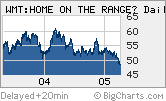 |
| Even though the stock's been a laggard, it has an attractive valuation as a result of Wal-Mart's consistent earnings growth. |
|
|
|
NEW YORK (CNN/Money) -
Labor unions hate it. Community activists don't want it in their neighborhoods. Disgruntled employees allege that it doesn't play or "pay" fair.
Could all this recent criticism of Wal-Mart actually be good news for investors looking for an undervalued growth stock?
After years of ignoring its critics, Wal-Mart finally seems to be realizing that negative publicity has hurt its stock and the world's biggest retailer last week began an image rebuilding campaign.
Wal-Mart CFO Tom Schoewe candidly admitted to reporters at a media gathering earlier in this month that he thought "all the negative things written about us" was eroding the stock's value.
Wal-Mart (Research) stock has remained locked between $45 and $60 a share for the past five years, and currently trade near a 52-week low.
Meanwhile, Schoewe may be concerned about the bad publicity but some analysts think the latest pullback -- it's down about 10 percent year to date -- spells a good opportunity.
John C. Thompson, portfolio manager with Thompson Plumb Growth Fund (Research), says he's been loading up on Wal-Mart. Wal-Mart currently represents 2 percent of the total holdings of the $1.2 billion fund.
"The stock's down more than 20 percent over the past five years but just look at the earnings growth during that same period," Thompson said.
The bull case
Despite all the bad press, there's still a lot to like.
First, while the stock's been stagnant, Wal-Mart's business is buzzing. Its earnings and sales have more than doubled in five years. Even though the company had to reduce its forecast for first-quarter earnings, even the lowered guidance represents 12 percent growth. Sales are expected to grow 13 percent.
Earnings are expected to grow about 14 percent a year over the next five years.
Second, though it has a whopping 5,700 stores worldwide (and generated $285 billion in sales last year), company executives say it still has room more to grow, especially overseas.
The advantage to consumers is that Wal-Mart can continue to leverage its size to demand lower prices from its vendors, which it can then pass to customers.
Third, Wal-Mart's valuation looks appealing, trading at 17.6 times current fiscal year's estimates of $2.72 a share -- fairly valued with its sector and cheaper than Target (Research), Costco (Research) and Dollar General (Research). Plus, Wal-Mart shares are currently yielding 1.3 percent.
Feeling the headwinds
There's no denying that Wal-Mart's sheer size gives it a leg up on competitors, but the "law of large numbers" could end up working against it.
For instance, profits grew faster than sales last year but so did expenses. And Wal-Mart's sales at stores open at least a year -- a key measure known as "same-store" sales -- have slowed markedly, rising 2.9 percent last year versus 5.9 percent growth two years earlier.
Edward Weller, analyst with ThinkEquity Partners, the lone Wall Street analyst with a "sell" rating on the stock, thinks that the slowing momentum in Wal-Mart's comparable sales growth could indicate that customers are beginning to migrate to other retailers who may not price items at "everyday low prices" but perhaps offer more variety of name-brand products than Wal-Mart
This past holiday season, shoppers snubbed Wal-Mart, turned off by its limited product selection and lean discounts. Same-store sales at arch rival Target (Research) have risen faster than Wal-Mart's for 10 straight month.
And industry experts say retail sales could be hurt by rising gas prices -- a matter of particular concern to Wal-Mart, many of whose customers live paycheck to paycheck.
"Higher gas prices mean less disposable income for Wal-Mart shoppers," said Schoewe. Fund manager Thompson counters that fluctuating gas prices could end up benefiting Wal-Mart, enabling it to take customers from higher-priced stores such as Walgreen and CVS.
When the going gets tough, start buying?
And, of course, the companies bad public relations hangs like a cloud over the stock.
As the country's largest non-union private sector employer with 1.5 million "associates," Wal-Mart has been hit with dozens of lawsuits alleging sexual discrimination and practices which shortchange employees out of pay. It has also recently settled charges it contracted illegal alien workers.
Additionally, the company also continues to face opposition from community groups when it tries to enter some cities and towns.
As Wal-Mart continues to expand, industry watchers say it will face more pressure from unions and government agencies to change its practices.
Even so, many analysts are willing to brave these waters. "It is at these [worst of times] that one should be buying Wal-Mart," UBS analyst Gary Balter wrote in a note to clients this month, citing the stock's valuation.
_____________________________________
Lookin' for a cheap date? Try Wal-Mart. Click here to read more.
More investment analysis:
3 bargains for uncertain times.
Sivy 70: America's best stocks.

|